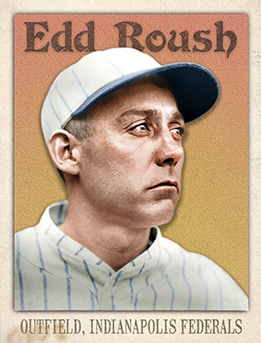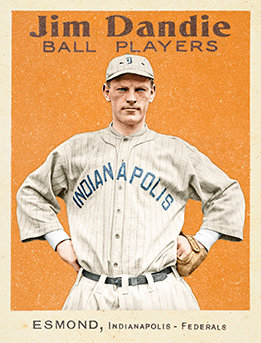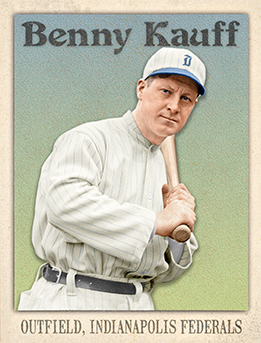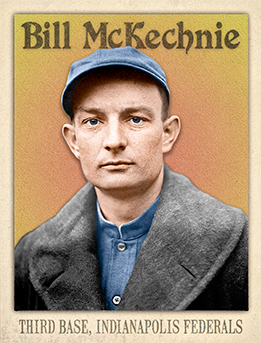
- Series: Diamond Heads '15
- City: Indianapolis
- Team: Hoosiers (FL)
- League: Federal League
- Hall: National Baseball Hall of Fame
Edd J. Roush (1893-1988) was an Indiana farm boy who knew his own mind. He built a Hall of Fame career on doing things his way. Spring training? Not for Edd, he stayed in shape. Use a bat heavier than any other player? Why not? His farm-bred arm strength allowed him to hit the ball wherever he chose with the weight of the bat doing most of the work. Stand still in the box awaiting the pitch? Not for Edd. He'd move his feet after the ball left the pitcher's hand, positioning himself according to his read. Endure management's miserly ways? No, Edd would hold out every year for a fairer contract. He'd skip to pirate leagues (the Federals) if necessary to find a better salary, something he had done as a school-boy player in Hoosier country and continued throughout his long and storied major league tenure. It took a few years in the bigs and a curious impatience by renowned manager John McGraw to get Edd to Cincinnati and the stage on which he would set records. Twice he edged out Rogers Hornsby for batting titles. He led the Reds to the Series championship in 1919, only to have that accomplishment tarnished by scandal. There is little doubt he was right in asserting that his club was better than Chicago's and really won it fair and square. During his twelve years with the Reds, Roush's batting average was .331. He never struck out more than 25 times in a season. He was fast on the bases and a terror in center, regarded as perhaps the premier defender of the Dead Ball era with Tris Speaker the competition.
- McGraw sent young Edd from the Giants to Cincy in 1916 along with two other future Hall-of-Famers: Bill McKechnie and Christy Mathewson. Matty was tickled to get a manager position and Edd and Bill were thrilled to get out from under the tough taskmaster McGraw
- When Edd threw out the ball at the last game played at Crosley Field, Joe Morgan said Roush was “the best of us all.”
- Elected to Hall of Fame: 1962

- Series: Jim Dandie Feds
- City: Indianapolis
- Team: Hoosiers (FL)
- League: Federal League
James Joseph Esmond (1889-1948) played shortstop for three major league clubs from 1911-1915, half of his tenure being with two Federal League teams: the Indianapolis Hoosiers and Newark Pepper. Jimmy had started in pro ball with the Gloversville-Johnstown/Elmira nine of the New York State League in 1908, a team with constituents all over the upstate area that would be reconstituted from 1939-51 in the Canadian-American League. Esmond never managed much offensive output in the minors and may have been that rare player to perform better when he got to the Cincinnati Reds in 1911 and hit .273. He reverted to form in '12, taking a demotion to the International League's Montreal team in 1913 before getting a final chance at major league glory in the renegade Federal League. He would be out of baseball for all of his late twenties before reappearing with Syracuse of the IL in 1921 at age 31. He then moved to the Eastern League and played a season each for Waterbury, Albany and Pittsfield. Jimmy's performance in Indiana and New Jersey far exceeded his norm, undoubtedly due to the paucity of truly major league caliber talent as the Feds tried valiantly to compete as a third league. He hit .295 for the Hoosiers with a league-leading 15 triples. Though his batting average subsided with the Peps he hit 11 more three-baggers showing extra-base prowess heretofore not in evidence. Esmond's debut in Newark allowed him to bask in the glow described in the local paper: “Newark and its surrounding hamlets were seized with a violent attack of baseball yesterday, accompanied by a high fever and laryngitis. The ailment can be directly traced to the opening of the Newark Federals at their new, roomy park in Harrison. The epidemic spread among nearly 25,000 Jersey folk who jammed the new park to see 'Whoa Bill' Phillip's 'Peps' make their home debut against Otto Knabe's Baltimore Terrapins.” The celebration was dampened a bit by the Terps' 6-2 victory. Sadly, Jimmy's three errors made it tough for starter Cy Falkenberg.
- Esmond's major league debut in Cincinnati was in the ballpark known as the Palace of the Fans, occupied by the franchise since 1902. In 1912 Jimmy and the Reds got to inaugurate Crosley Field, the team's home until 1970
- Series: Diamond Heads '15
- City: Indianapolis
- Team: Hoosiers (FL)
- League: Federal League
- Hall: National Baseball Hall of Fame
William Boyd McKechnie (1886-1965) was a noted baseball strategist and the only manager to lead three teams to NL pennants. Won World Series titles with two clubs: the ’25 Pirates and ’40 Reds. A player, manager and then coach for nearly half a century, “the Deacon” was known for his temperance and piety.
- Served as coach for young Indians manager, Lou Boudreau, winning the ’48 Series
- Elected to Hall of Fame: 1962

- Series: Diamond Heads '15
- City: Indianapolis
- Team: Hoosiers (FL)
- League: Federal League
Benjamin Michael Kauff (1890-1961) came oh so close to owning the Big Apple. The brash, dapper young outfielder had all the tools, all five to be exact. And he had attitude. And style. For unknown reasons, the Highlanders gave up on the rookie in 1912 after a mere five games and consigned him to the minors. Kauff then detoured to the Federal League in ‘14-15, tearing up the league in all offensive categories. John McGraw had tried to get Benny before losing out to the upstart Feds and finally succeeded when the circuit folded. Sadly for Kauff, his press notices as the “Ty Cobb of the Federal League” rang hollow when he could only muster a .264 average in 1916 for the Giants. He raised that average over .300 until the war intervened but never set the world on fire. Caught up in the maelstrom of 1919 shadiness, Kauff gained a reputation for dishonesty that would haunt him when he faced felony theft charges the next year.
- Despite being exonerated with McGraw’s help, Ban Johnson and Kenesaw Landis didn’t buy it. The Black Sox affair had created a climate where the Judge would brook no hint of scandal and Kauff was banned from the game



